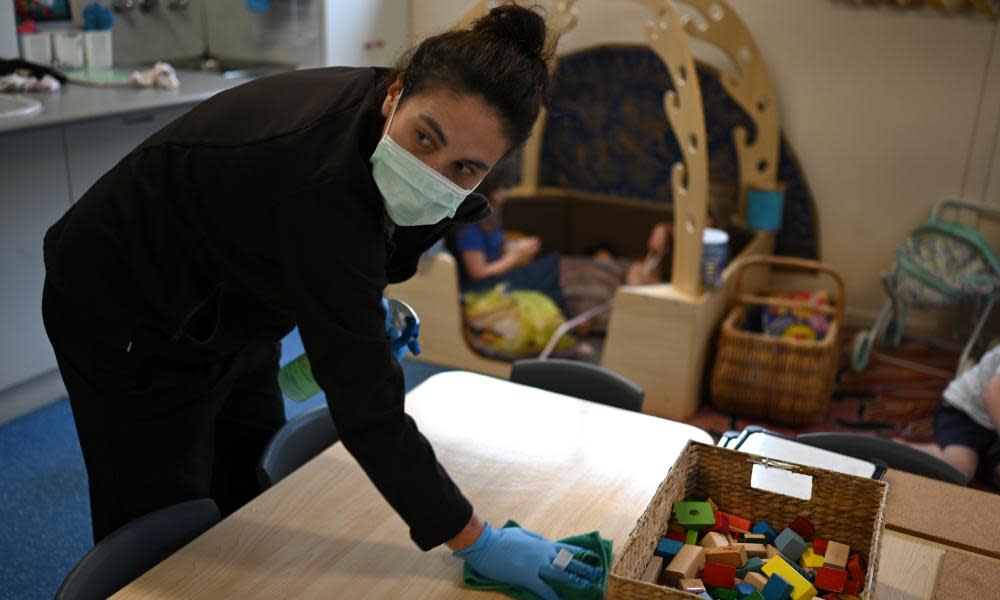Mass exodus: Australia faces loss of 600,000 people and skills recovery will be slow, Ceda says

Australia’s net overseas migration will not fully recover until 2024 as the nation faces a “cumulative” loss of more than 600,000 people due largely to the pandemic, an economic thinktank says.
The Committee for Economic Development of Australia (Ceda) has released a report calling on the Albanese government to “outline how it intends to address the Covid-19 induced drag on the migration system”, specifically by raising migration and clearing visa processing backlogs.
“New approaches are now required in an environment where advanced economies are simultaneously facing pandemic induced skills shortages and major economic transitions in climate and energy, technology and caring that all demand skilled labour,” Ceda said in a new report.
Ahead of the jobs and skills summit on Thursday and Friday, Ceda has proposed that various lists of skills shortages that qualify for different visas should be consolidated into one, or replaced by a wage threshold and jobs matching mechanisms.
Related: Australia’s jobs and skills summit: who’s going and what’s on the agenda?
It has called for an essential skills visa to provide a boost to the aged care, childcare, disability and healthcare workforces.
“Temporary skilled migrants now account for around 0.7 per cent of the labour force, less than half the level when temporary skilled migration peaked shortly after the mining boom,” Ceda found.
“Australia’s migration system has been playing catch-up since borders reopened. Net overseas migration will not fully recover until 2024, a loss of over 600,000 people since the middle of 2020, 83 per cent of whom are generally of working age.
The education minister, Jason Clare, on Tuesday suggested some of Australia’s workforce shortages could be eased by allowing international students to stay longer.
Under current rules, some students are entitled to stay only 18 months after they finished their degree or diploma.
Clare told the Australian Financial Review higher education summit that only 16% of international students stay on after their studies.
“A lot of those students are delivering us food and serving coffee in between classes,” he said.
“But when they graduate, they go home. Wouldn’t it be great if they stayed on and helped us fill some of the chronic skills gaps we have got?
“Seems like a no brainer. Other countries have cottoned on to this and have changed their visa settings and it’s something I think that’s worth looking at here too.”
Proposals and debate ahead of the jobs summit may not agree on the level of migration that Australia should have, but they agree on the important role migration should play and that the skilled migration system must be made simpler, more efficient and transparent.
Unions have accepted that permanent migration can rise by 40,000 to 200,000 a year, provided the government enacted other protections and levers to encourage wage growth, including a pay floor of $90,000 for temporary skilled migrants.
Summit guest list revealed
Meanwhile, the guest list for the summit has been released.
It includes seaweed farmers Sea Forest, property management tech startup :Different, and playwrighting prize administrators the Lysicrates Foundation.
According to the attender list, released by the treasurer Jim Chalmers, the event featuring employers, unions, government and civil society has ballooned to 143 participants, up from the initial 100.
Related: Australia’s jobs and skills summit: who’s going and what’s on the agenda?
These include Sea Forest chief executive, Sam Elsom, whose company fights climate change by being the first in the world to cultivate edible red macroalgae (Asparagopsis) at a commercial scale.
As a feed supplement for cows, the seaweed can lower methane production – likely to be a big hit at the summit’s “workforce opportunities from clean energy and tackling climate change” session on Thursday.
:Different co-founder, Mina Radhakrishnan, a board member of the Tech Council of Australia, and John Azarias, chairman of Lysicrates Foundation and former senior tax partner at Deloitte will also attend.
Anthony Albanese has defended the government’s decision not to invite the big four banks, some of Australia’s largest employers, citing the fact the Australian Banking Association will participate.

 Yahoo News
Yahoo News 
